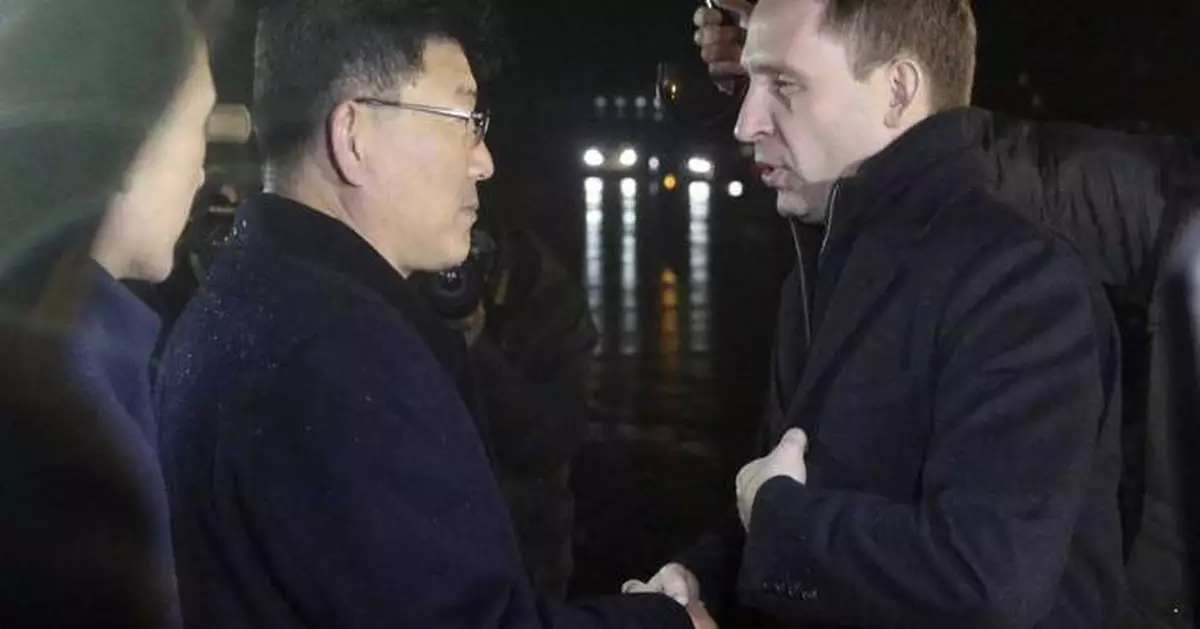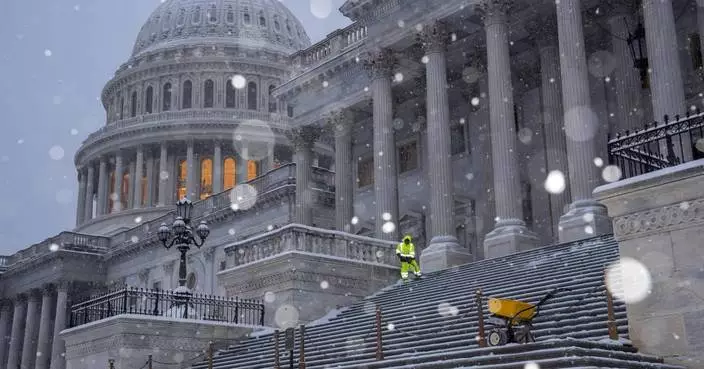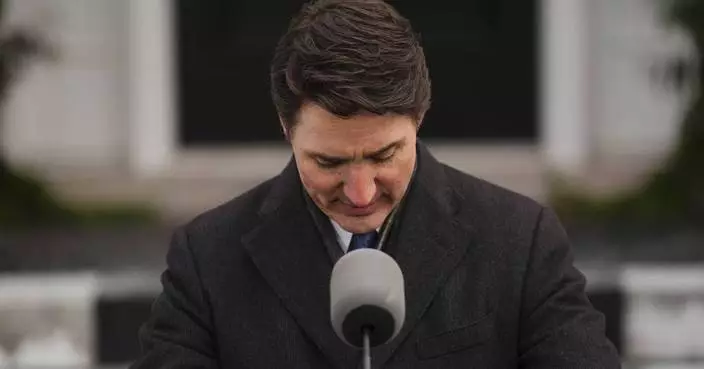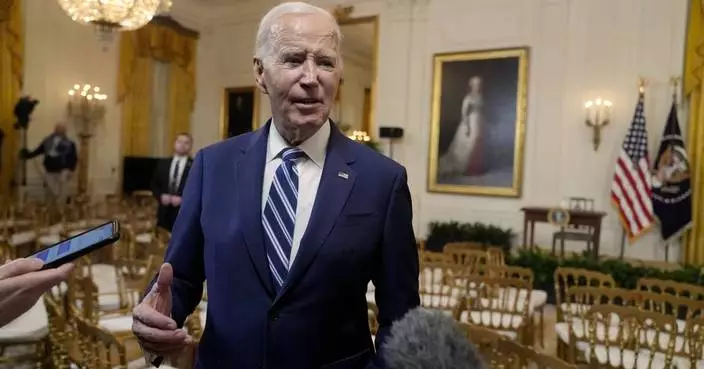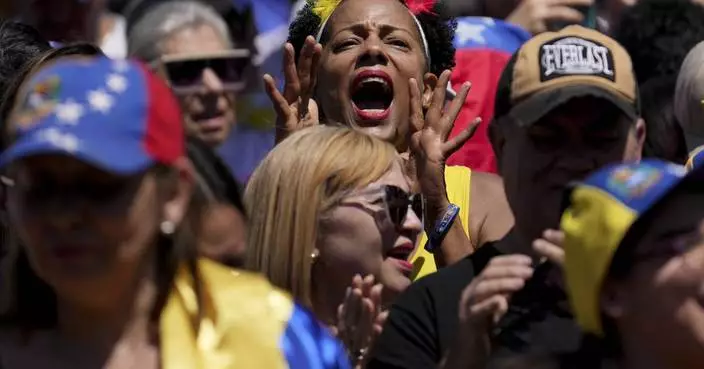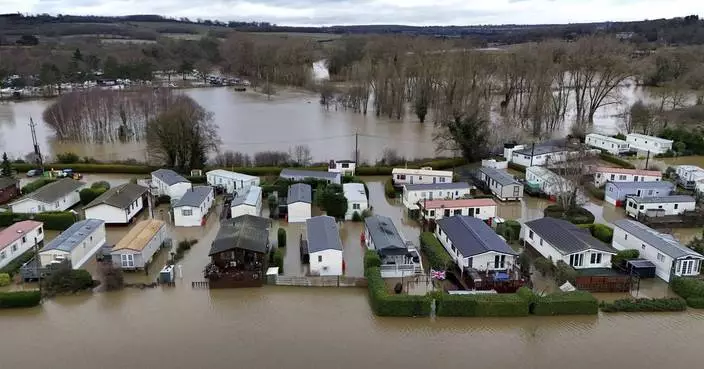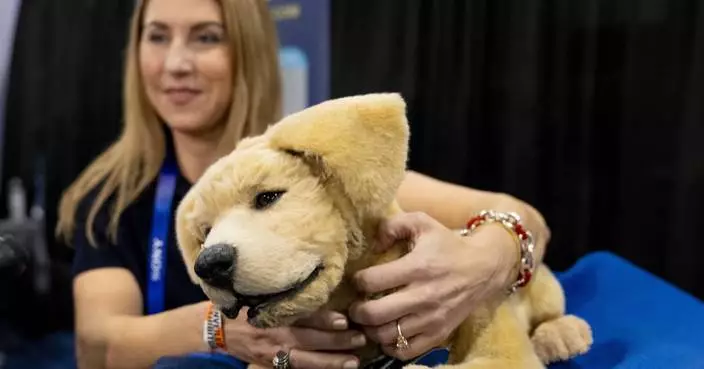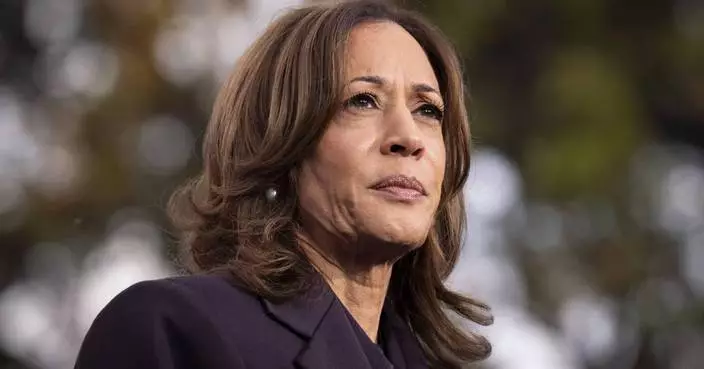SEOUL, South Korea (AP) — North Korea and Russia reached a new agreement for expanding economic cooperation following high-level talks in Pyongyang this week, the North’s state media said Thursday, as they continue to align in the face of their confrontations with Washington.
North Korea’s official Korean Central News Agency didn’t elaborate on the details of the agreement signed Wednesday between its senior trade officials and a Russian delegation led by Alexandr Kozlov, the country’s minister of natural resources and ecology. The Russian news agency Tass on Tuesday said officials following an earlier round of talks agreed to increase the number of charter flights between the countries to promote tourism.
Kozlov, who arrived in North Korea on Sunday, met with North Korean leader Kim Jong Un and his top economic official, Premier Kim Tok Hun, before returning home on Wednesday, KCNA said. During Kozlov’s visit, Russian President Vladimir Putin’s gifted Pyongyang’s Central Zoo with more than 70 animals, including lions, bears and several species of birds, according to Tass, in another display of the countries’ growing ties.
Kim Jong Un in recent months has prioritized relations with Moscow as he attempts to break out of international isolation and strengthen his footing, actively supporting Putin’s war on Ukraine while portraying the North as a player in a united front against Washington.
Kim has yet to directly acknowledge that he has been providing military equipment and troops to Russia to support its fighting against Ukraine. South Korea’s National Intelligence Service told lawmakers in a closed-door briefing on Wednesday that an estimated 11,000 North Korean soldiers in late October were moved to Russia’s Kursk region, where Ukrainian troops seized parts of its territory this year, following their training in Russia’s northeast.
The spy agency believes the North Korean soldiers were assigned to Russia’s marine and airborne forces units and some of them have already begun fighting alongside the Russians on the frontlines, said Lee Seong Kweun, a lawmaker who attended the meeting. U.S., South Korean and Ukrainian officials have claimed that the North has also been supplying Russia with artillery systems, missiles and other equipment.
North Korea would be possibly getting anywhere between $320 million to $1.3 billion annually from Russia for sending its troops to Ukraine, considering the scale of the dispatch and the level of payments Russia has been providing to foreign mercenaries, according to a recent study by Lim Soo-ho, a South Korean analyst at an NIS-run think tank.
While that would be meaningful income for North Korea’s crippled and heavily sanctioned economy, it could be lower than the money the North earns from illicit coal exports or supplying military equipment to Russia, Lim said. This suggests that North Korea’s troop dispatch is less about money than acquiring key Russian technologies to further advance its nuclear weapons and missile program, which is a major concern in Seoul, Lim said.
Amid the stalemate in larger nuclear negotiations with Washington, Kim has been dialing up pressure on South Korea, abandoning his country’s long-standing goal of inter-Korean reconciliation and verbally threatening to attack the South with nukes if provoked. He has used Russia’s war on Ukraine as a distraction to accelerate the development of his nuclear-armed military, which now has various nuclear-capable systems targeting South Korea and intercontinental ballistic missiles that can potentially reach the U.S. mainland.
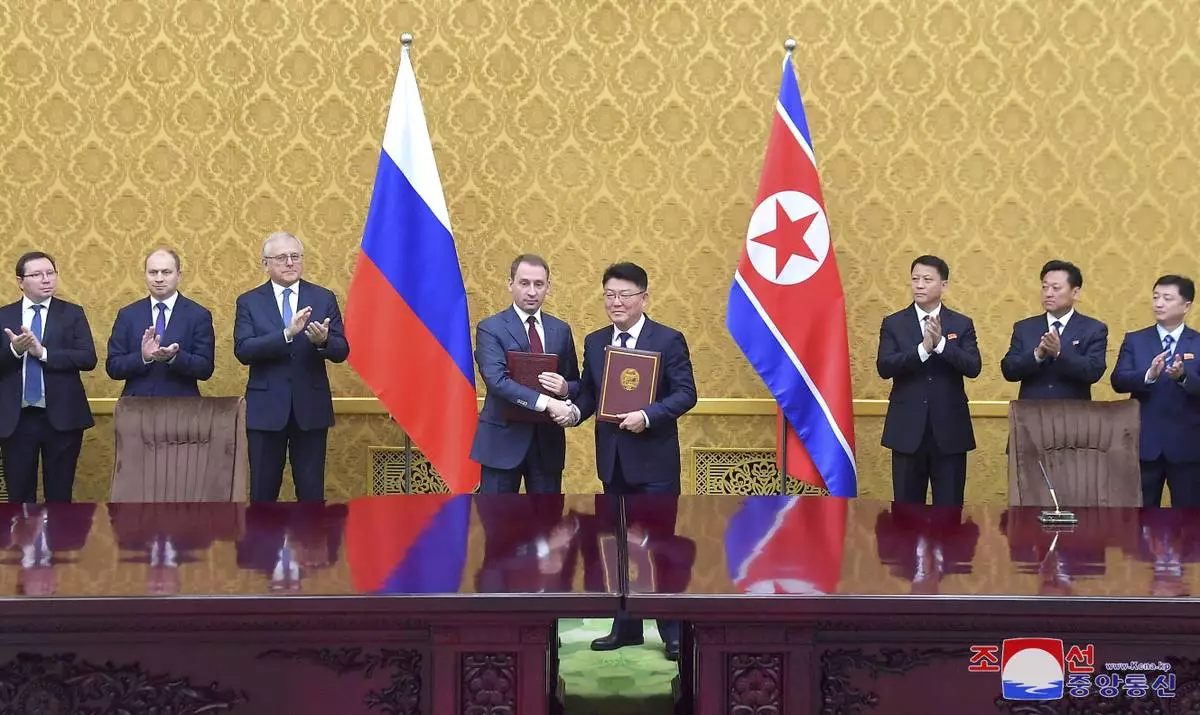
In this photo provided by the North Korean government, North Korea’s Foreign Minister of Economic Affairs Yoon Chung-ho, center right and Russia’s minister of natural resources and ecology Alexandr Kozlov, center left, shake hands at the signing ceremony of the protocol of the 11th meeting of the North Korea-Russia Intergovernmental Committee on Trade, Economy and Science and Technology Cooperation at Pyongyang , North Korea, Wednesday, Nov. 20, 2024. Independent journalists were not given access to cover the event depicted in this image distributed by the North Korean government. The content of this image is as provided and cannot be independently verified. Korean language watermark on image as provided by source reads: "KCNA" which is the abbreviation for Korean Central News Agency. (Korean Central News Agency/Korea News Service via AP)
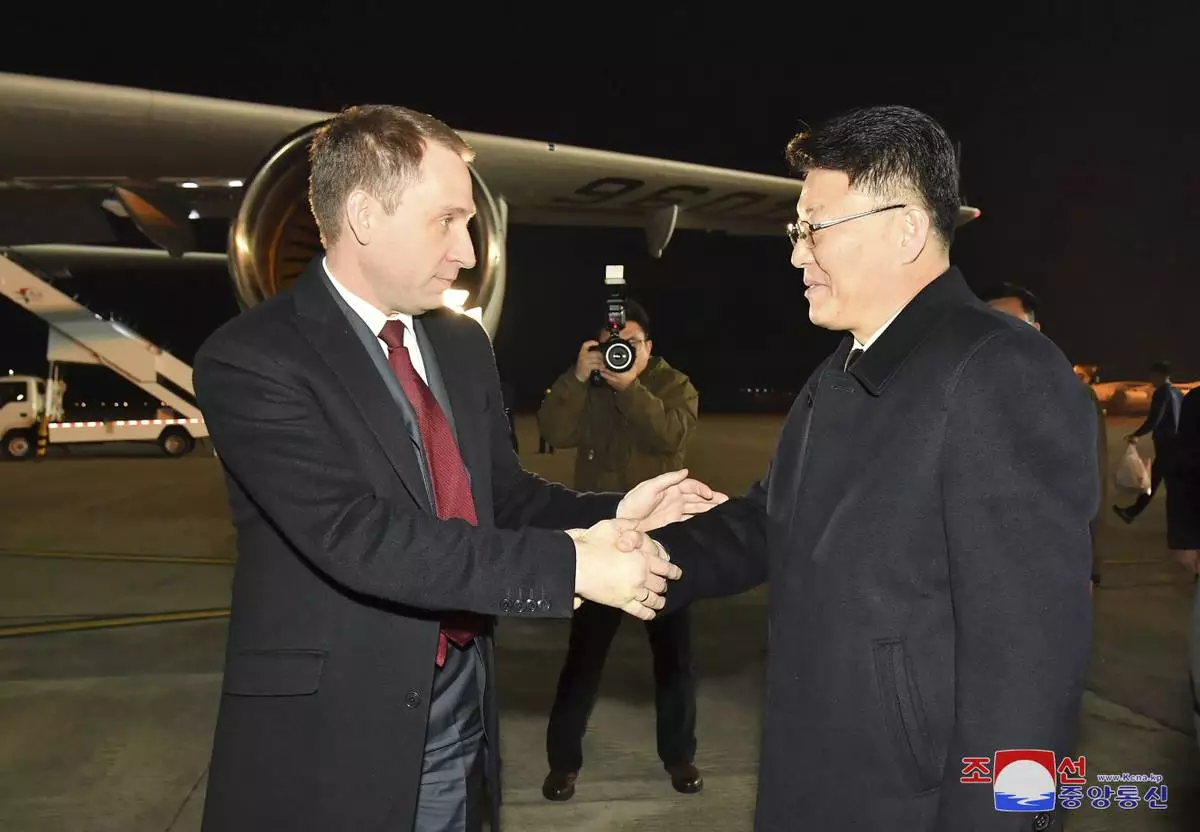
In this photo provided by the North Korean government, North Korea’s Foreign Minister of Economic Affairs Yoon Chung-ho sees off Russia’s minister of natural resources and ecology Alexandr Kozlov, left, at Pyongyang International Airport, North Korea, Wednesday, Nov. 20, 2024. Independent journalists were not given access to cover the event depicted in this image distributed by the North Korean government. The content of this image is as provided and cannot be independently verified. Korean language watermark on image as provided by source reads: "KCNA" which is the abbreviation for Korean Central News Agency. (Korean Central News Agency/Korea News Service via AP)
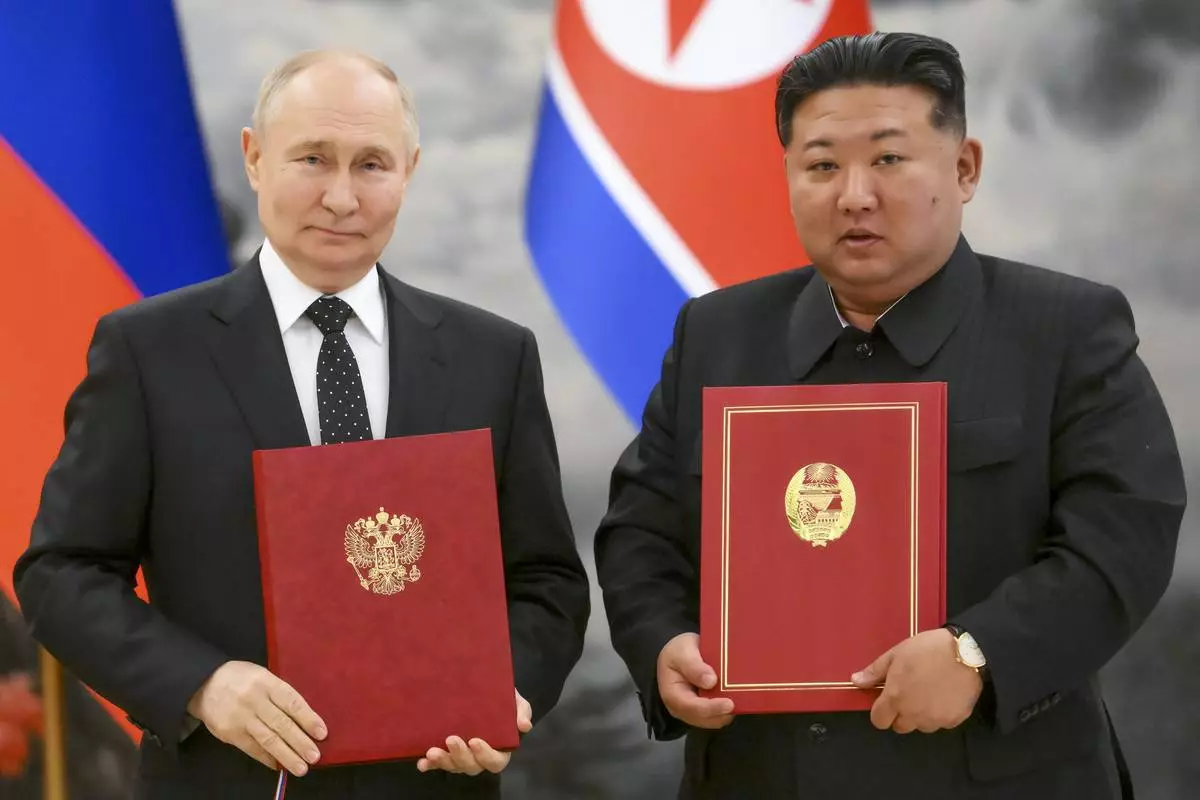
FILE - Russian President Vladimir Putin, left, and North Korea's leader Kim Jong Un pose for a photo during a signing ceremony of the new partnership in Pyongyang, North Korea, on June 19, 2024. (Kristina Kormilitsyna, Sputnik, Kremlin Pool Photo via AP, File)
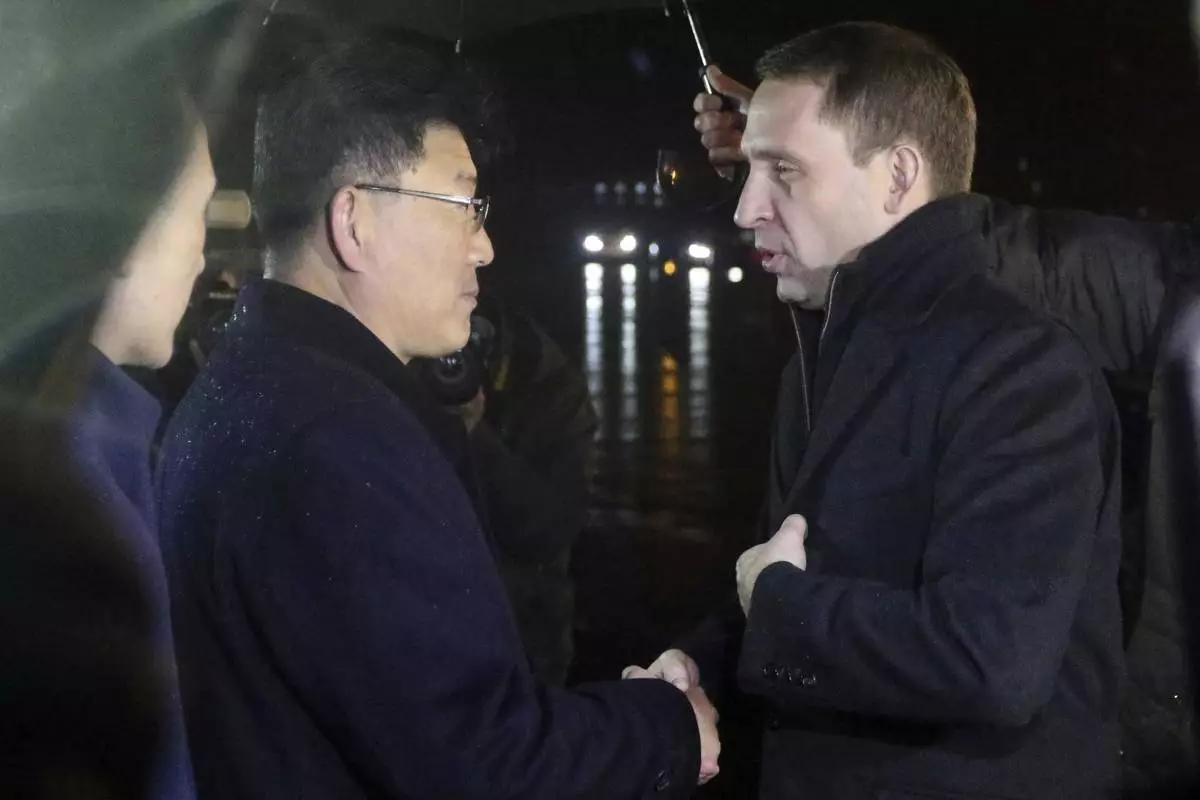
FILE - Russia's natural resources minister Alexander Kozlov, right, is greeted by Yun Jong Ho, minister of External Economic Relations, as the Russian delegation leave Pyongyang Airport in Pyongyang, on Nov. 16, 2023. (AP Photo/Jon Chol Jin, File)
TORONTO (AP) — Canadian Prime Minister Justin Trudeau announced his resignation Monday after nearly a decade in power, bowing to rising discontent over his leadership and growing turmoil within his government signaled by the abrupt departure of his finance minister.
Trudeau, the latest incumbent to be driven out amid rising voter dissatisfaction worldwide, said it had become clear to him that he cannot "be the leader during the next elections due to internal battles.” He planned to stay on as prime minister until a new leader of the Liberal Party is chosen.
“I don’t easily back down faced with a fight, especially a very important one for our party and the country. But I do this job because the interests of Canadians and the well being of democracy" are "something that I hold dear," said Trudeau, who was initially teary-eyed at the announcement outside his official residence.
He said Parliament, which had been due to resume Jan. 27, would be suspended until March 24. The timing will allow for a Liberal Party leadership race.
All three main opposition parties have said they plan to topple the Liberal Party in a no-confidence vote when Parliament resumes, so a spring election after the Liberals pick a new leader was almost assured.
“The Liberal Party of Canada is an important institution in the history of our great country and democracy. A new prime minister and leader of the Liberal Party will carry its values and ideals into that next election,” Trudeau said. “I am excited to see that process unfold in the months ahead.”
Trudeau came to power in 2015 after 10 years of Conservative Party rule and was initially hailed for returning the country to its liberal past. But the 53-year-old scion of one of Canada’s most famous prime ministers became deeply unpopular with voters in recent years over a range of issues, including the soaring cost of food and housing, and surging immigration.
Speaking in a recorded message posted on X, opposition Conservative leader Pierre Poilievre said Canadians “desperate to turn the page on this dark chapter in our history might be relieved” that Trudeau is leaving. "But what has really changed? Every Liberal MP in power today and every potential Liberal leadership contender fighting for the top job helped Justin Trudeau break the country over the last nine years.”
Other opposition leaders added their own criticism, including Jagmeet Singh, who leads the NDP party.
“It doesn’t matter who the next Liberal is. They’ve let you down. They do not deserve another chance,” said Singh, who propped up Trudeau’s party for years.
The president of the Liberal party, Sachit Mehra, said in a statement that party members were “immensely grateful” to Trudeau for delivering “transformational progress” for Canadians, including $10-a-day child care, dental care and a national climate plan. Mehra said he would call a meeting this week to begin selecting a new leader.
The political upheaval comes at a difficult moment for Canada internationally. U.S. President-elect Donald Trump has threatened to impose 25% tariffs on all Canadian goods if the government does not stem what Trump calls a flow of migrants and drugs in the U.S. — even though far fewer of them cross into the U.S. from Canada than from Mexico, which Trump has also threatened.
Canada is a major exporter of oil and natural gas to the U.S., which also relies on its northern neighbor for steel, aluminum and automobiles.
After Trudeau's announcement, Trump, who for weeks has referred to Canada as the 51st state, did so again and incorrectly claimed on social media that the prime minister resigned because Canada relies on subsidies from the U.S. to stay afloat.
Trudeau kept publicly mum in recent weeks, despite intensifying pressure for him to step down.
“His long silence following this political drama speaks volumes about the weakness of his current position,” said Daniel Béland, a political science professor at McGill University in Montreal.
Canada’s former finance minister, Chrystia Freeland, announced her resignation from Trudeau’s Cabinet on Dec. 16, criticizing some of Trudeau’s economic priorities in the face of Trump’s threats. The move, which came shortly after the housing minister quit, stunned the country and raised questions about how much longer the increasingly unpopular Trudeau could stay in his job.
Freeland and Trudeau had disagreed about two recently announced policies: a temporary sales tax holiday on goods ranging from children’s clothes to beer, and plans to send every citizen a check for $250 Canadian ($174). Freeland, who was also deputy prime minister, said Canada could not afford “costly political gimmicks” in the face of the tariffs threat.
“Our country is facing a grave challenge,” Freeland wrote in her resignation letter. “That means keeping our fiscal powder dry today, so we have the reserves we may need for a coming tariff war.”
Trudeau had been planning to run for a fourth term despite his party's displeasure. Prime ministers in Canada can stay in office as long as their government or party has the confidence of a majority in the House of Commons, but no Canadian prime minister in more than a century has won four straight terms.
Trudeau's party recently suffered upsets in special elections in two districts in Toronto and Montreal that it has held for years. And based on the latest polls, his chances for success looked slim. In the latest poll by Nanos, the Liberals trail the Conservatives 47% to 21%.
Over his long tenure, Trudeau embraced an array of causes favored by his liberal base. He spoke in favor of immigration at a time other countries were trying to tighten their borders. He championed diversity and gender equality, appointing a Cabinet that was equal parts men and women. He legalized cannabis.
His efforts to strike a balance between economic growth and environmental protection were criticized by both the right and left. He levied a tax on carbon emissions and rescued a stalled pipeline expansion project to get more of Alberta’s oil to international markets.
Fewer people died from COVID-19 in Canada than elsewhere, and his government provided massive financial support. But animosity grew among those opposed to vaccine mandates. Flags with Trudeau’s name and expletives became a common sight in rural parts.
A combination of scandal and unpopular policies damaged his prospects over time.
Trudeau’s father swept to power in 1968 and led Canada for almost 16 years, becoming a storied name in the country’s history, most notably by opening its doors wide to immigrants. Pierre Trudeau was often compared to John F. Kennedy and remains one of the few Canadian politicians who are recognized in America.
Tall and trim, with movie-star looks, Justin Trudeau channeled the star power — if not quite the political heft — of his father.
He became the second-youngest prime minister in Canada’s history, and rivals said his age was a liability when he first sought office. But he won a sweeping mandate in a come-from-behind victory in 2015.
Trudeau is a former teacher, nightclub bouncer and snowboard instructor who has three children with his now estranged wife, a former model and TV host.
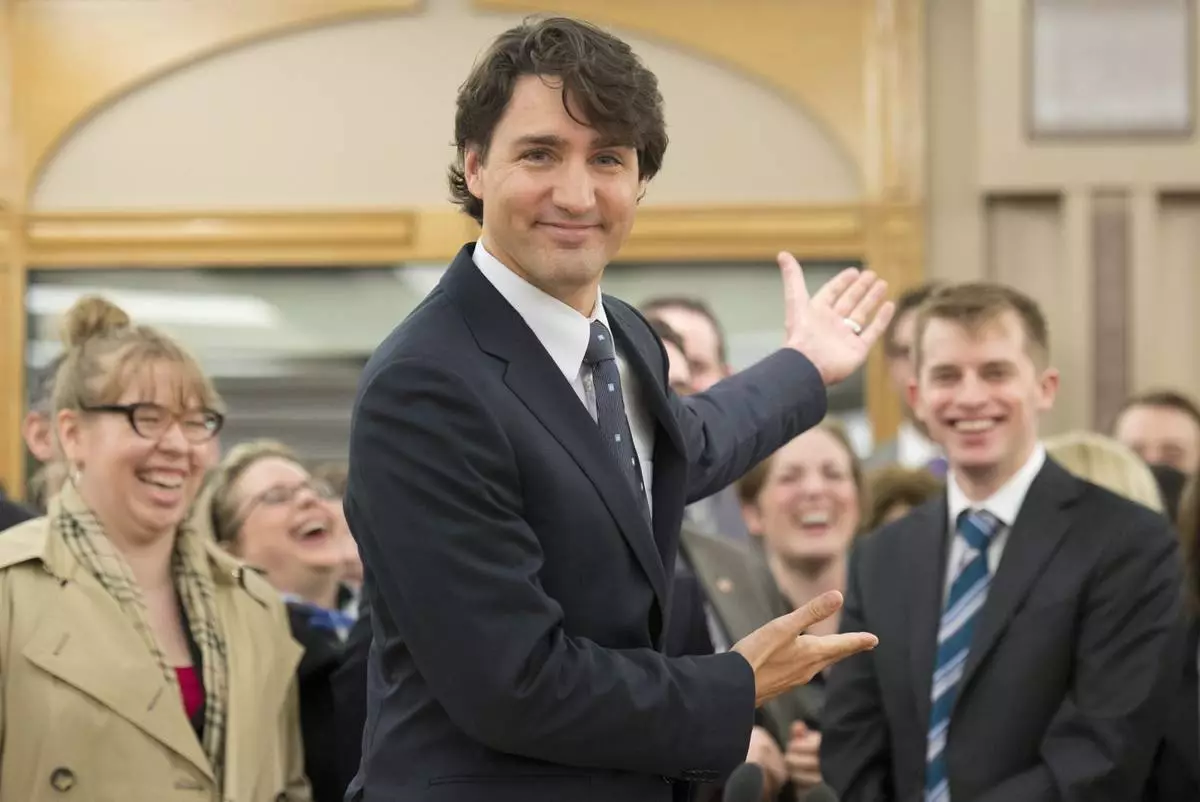
FILE - Liberal Leader Justin Trudeau gestures for media to leave so he can begin his first caucus meeting as leader on April 17, 2013, in Ottawa. (Adrian Wyld/The Canadian Press via AP, File)
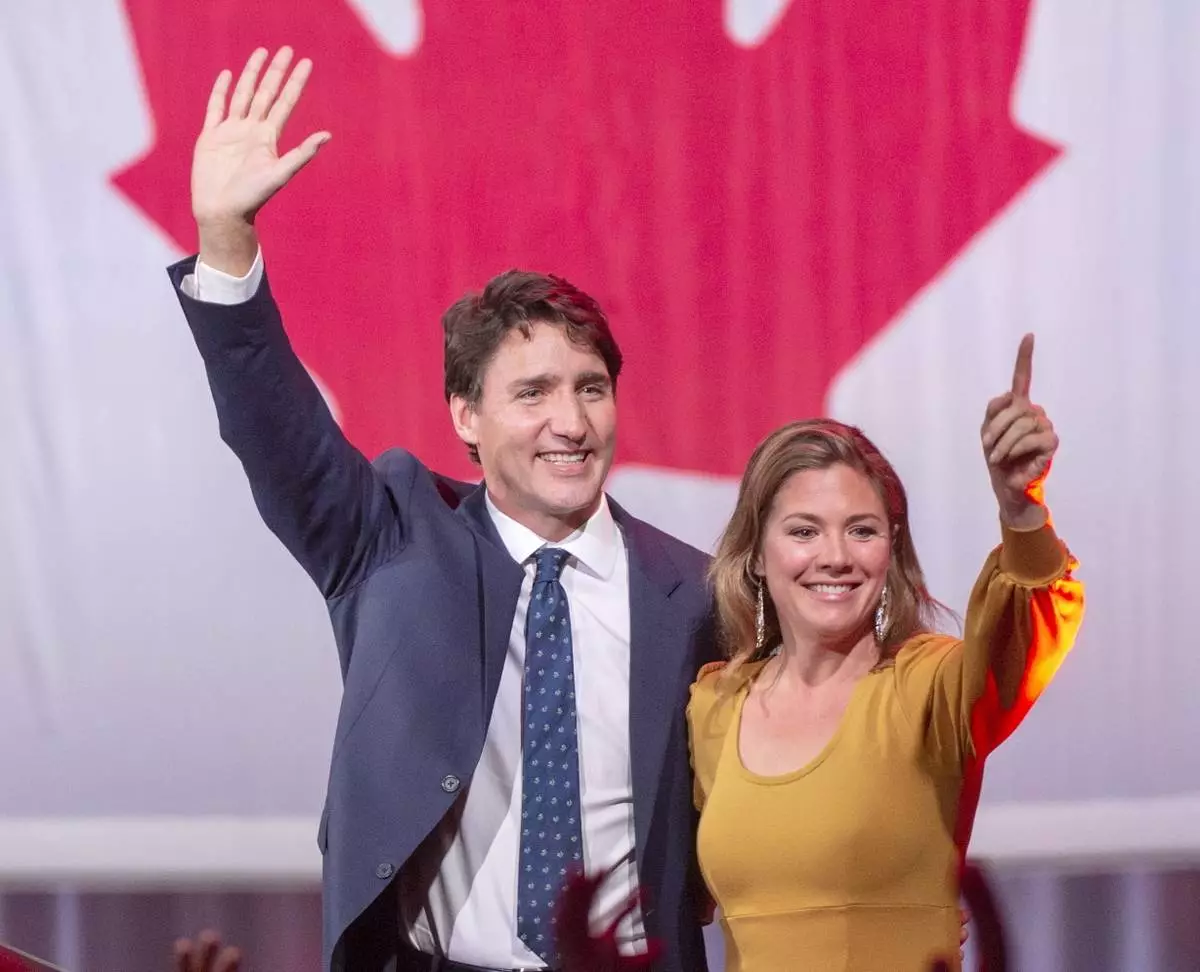
FILE - Liberal leader Justin Trudeau celebrates with his wife, Sophie Gregoire, after winning a minority government at the election night headquarters on Oct. 22, 2019, in Montreal. (Ryan Remiorz/The Canadian Press via AP, File)
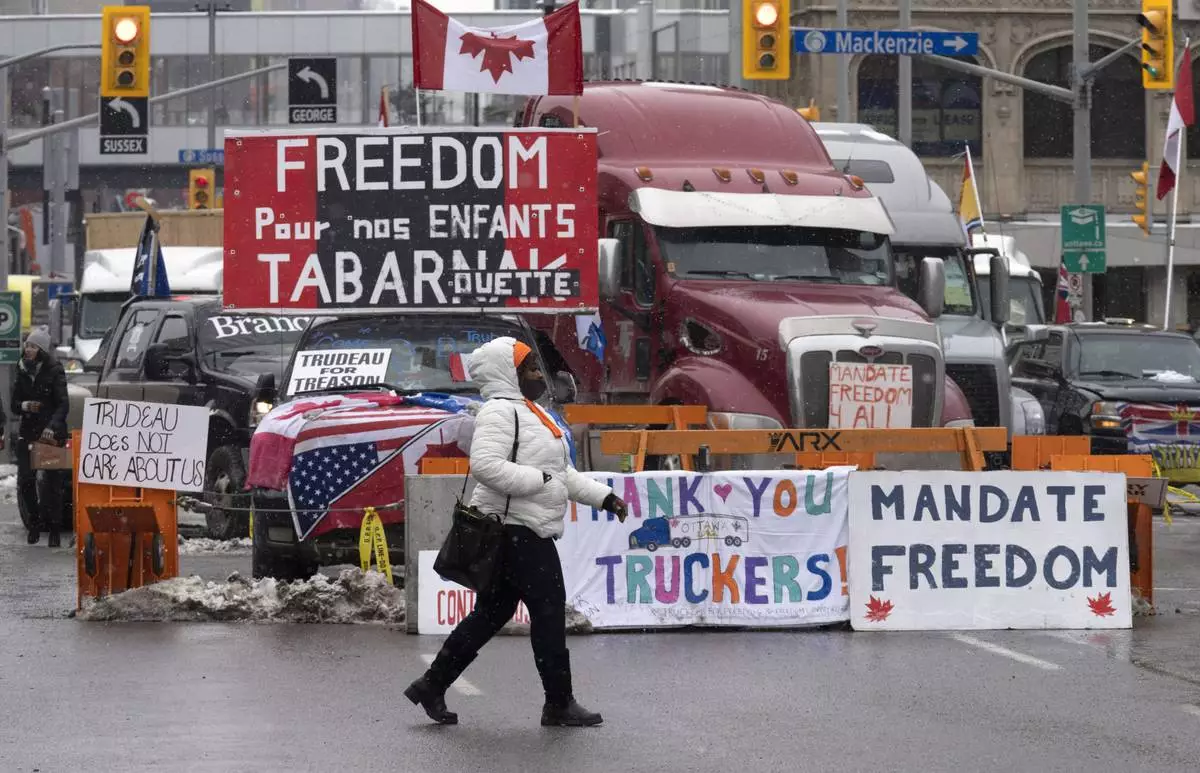
FILE - A woman crosses the street in front of vehicles parked as part of the trucker protest, on Feb. 8, 2022 in Ottawa. Canadian lawmakers expressed increasing worry about protests over vaccine mandates other other COVID restrictions after the busiest border crossing between the U.S. and Canada became partially blocked. (Adrian Wyld /The Canadian Press via AP, File)
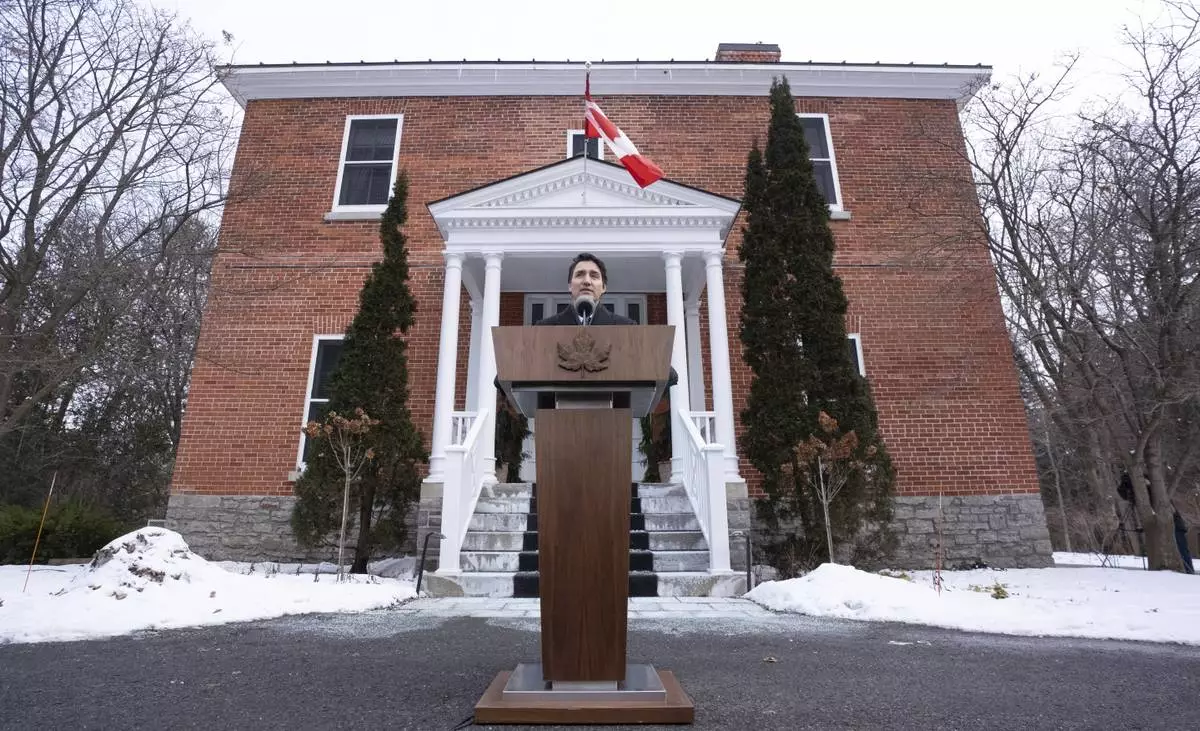
Canada Prime Minister Justin Trudeau speaks with media outside Rideau Cottage, Monday, Jan. 6, 2025 in Ottawa. (Adrian Wyld/The Canadian Press via AP)
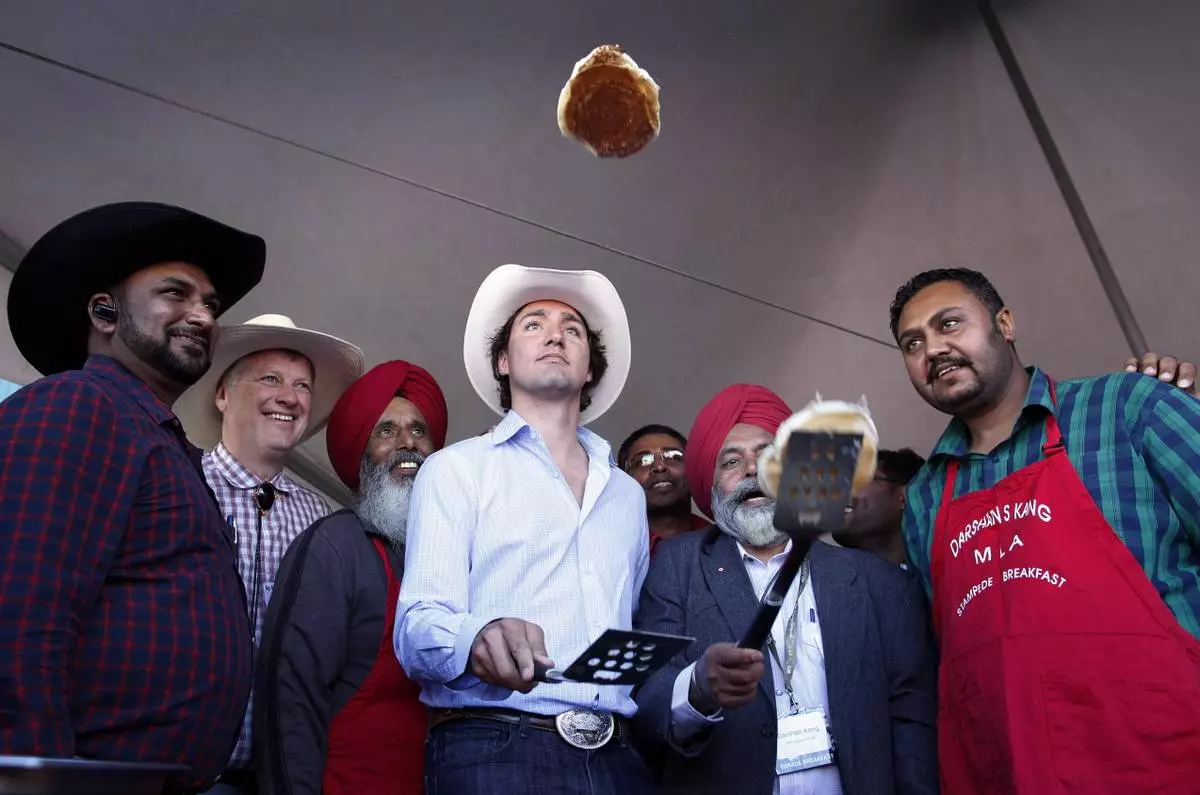
FILE - Liberal leader Justin Trudeau, center, flips pancakes at a Stampede breakfast in Calgary, Alta., on July 7, 2013. (Jeff McIntosh/The Canadian Press via AP, File)
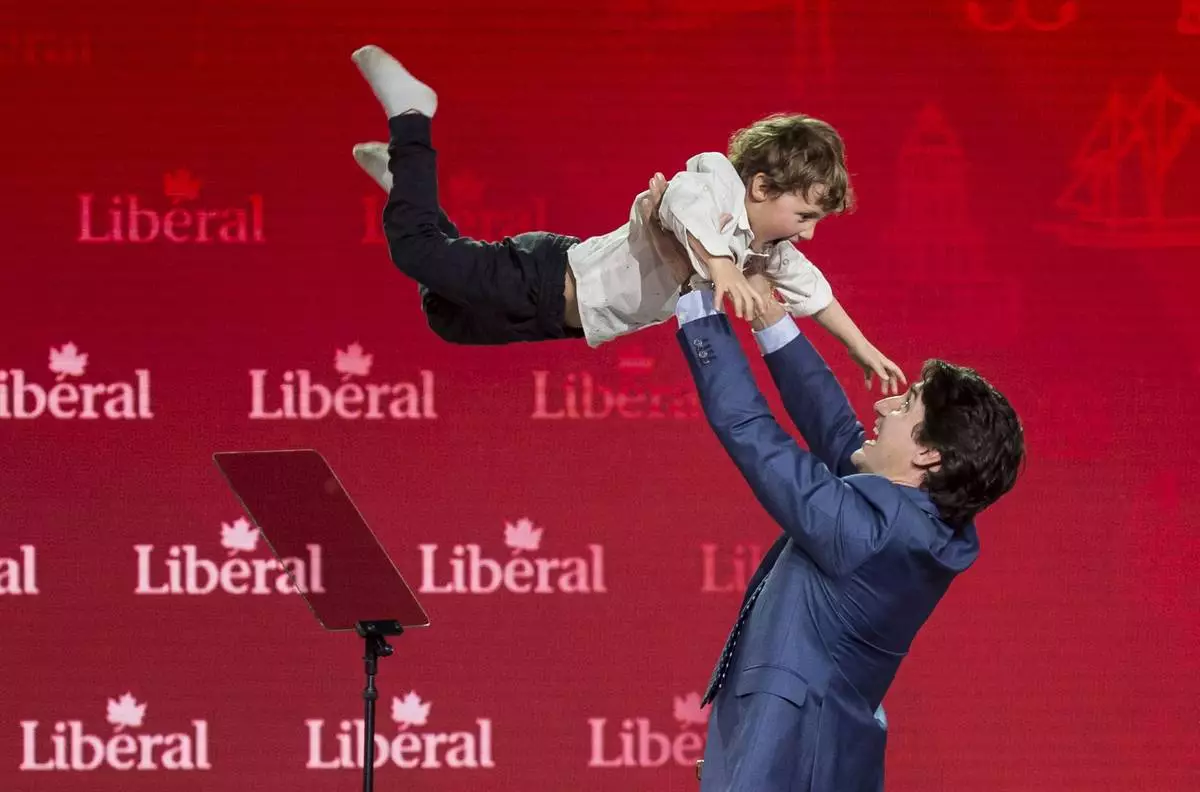
FILE - Prime Minister Justin Trudeau lifts his son Hadrien into the air following his speech at the federal Liberal national convention in Halifax on April 21, 2018. (Darren Calabrese/The Canadian Press via AP, File)
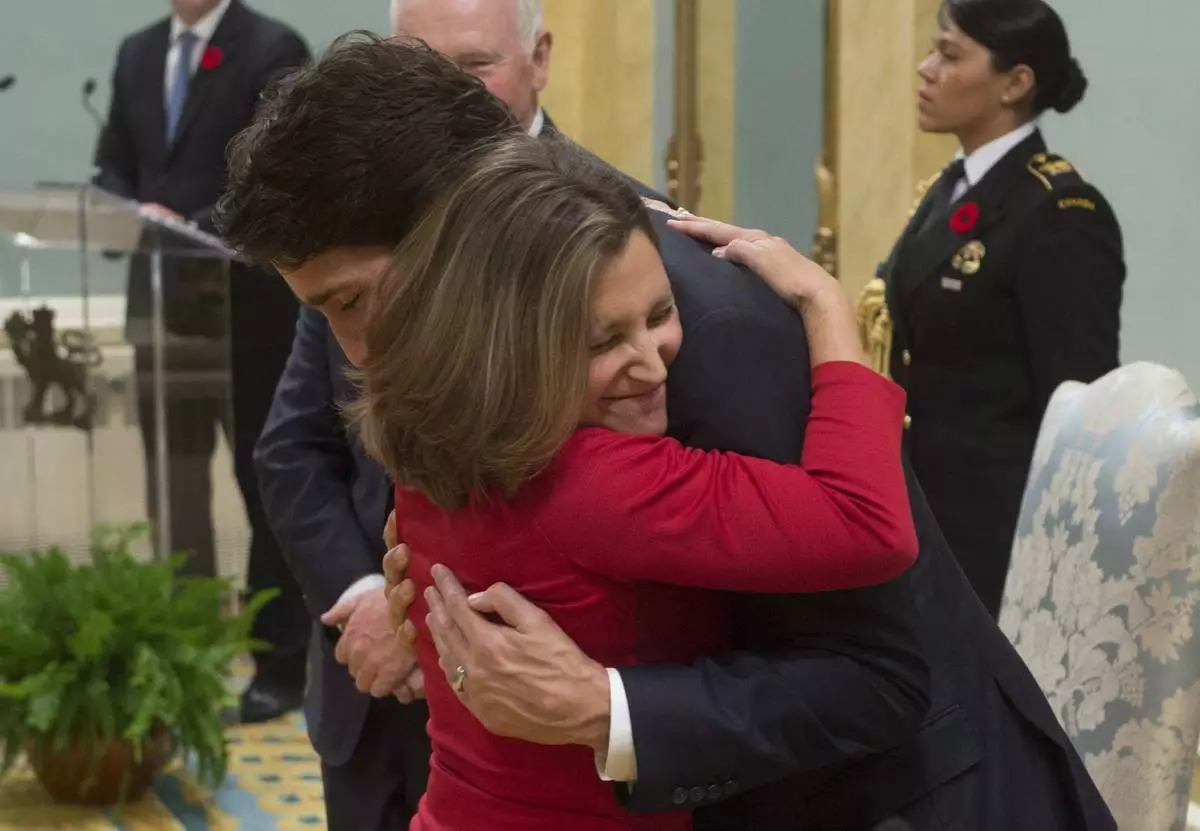
FILE - Minister of International Trade Chrystia Freeland gives Prime Minister Justin Trudeau a hug after being sworn in during ceremonies at Rideau Hall, on Nov. 4, 2015, in Ottawa. (Adrian Wyld/The Canadian Press via AP, File)
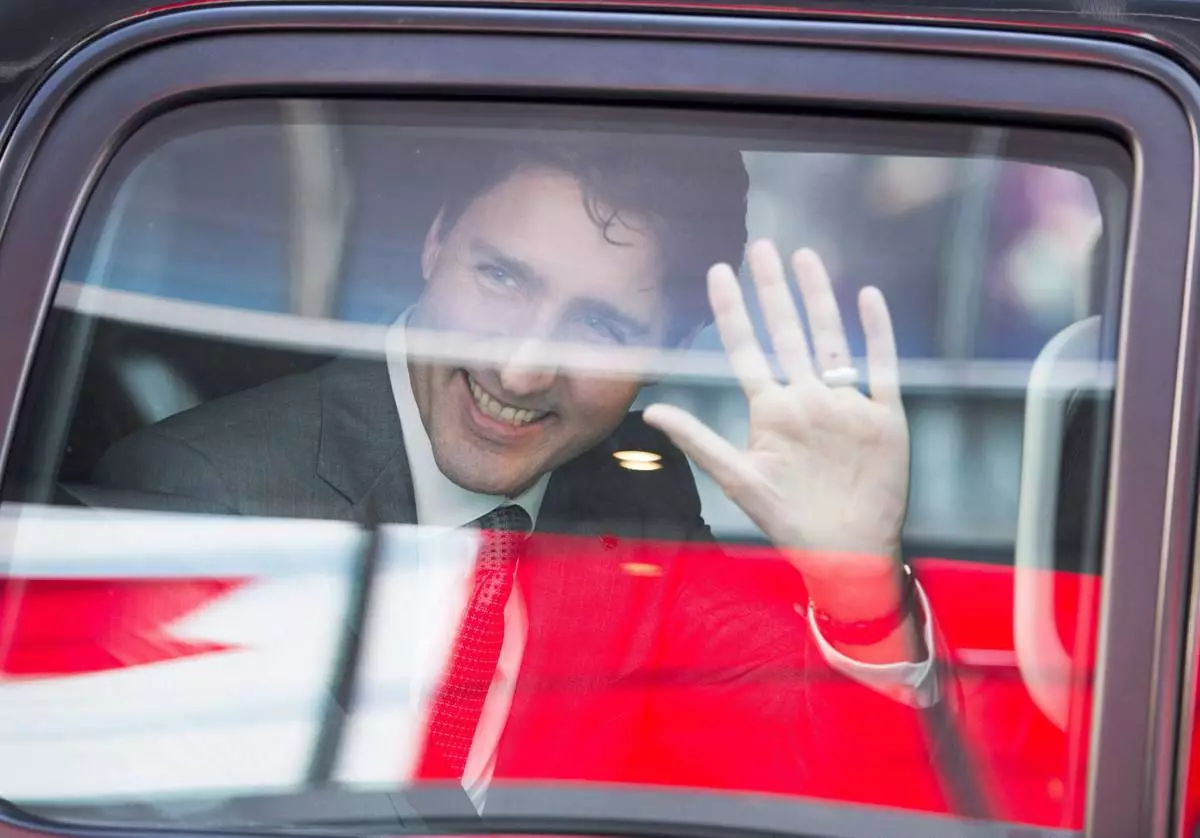
FILE - Prime Minister Justin Trudeau waves as he leaves the offices of Salesforce on Feb. 8, 2018, in San Francisco. (Ryan Remiorz/The Canadian Press via AP, File)
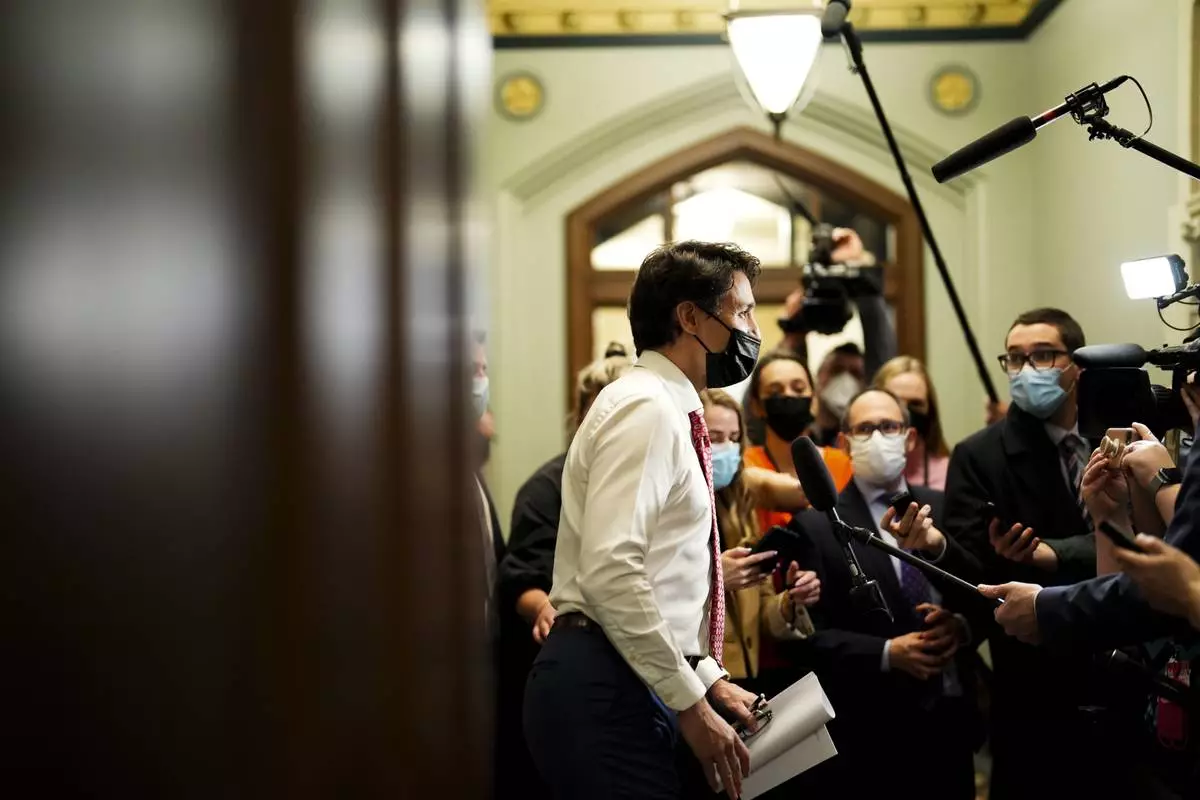
FILE - Prime Minister Justin Trudeau talks to reporters as he arrives at a caucus meeting on Parliament Hill in Ottawa on April 6, 2022. (Sean Kilpatrick/The Canadian Press via AP, File)
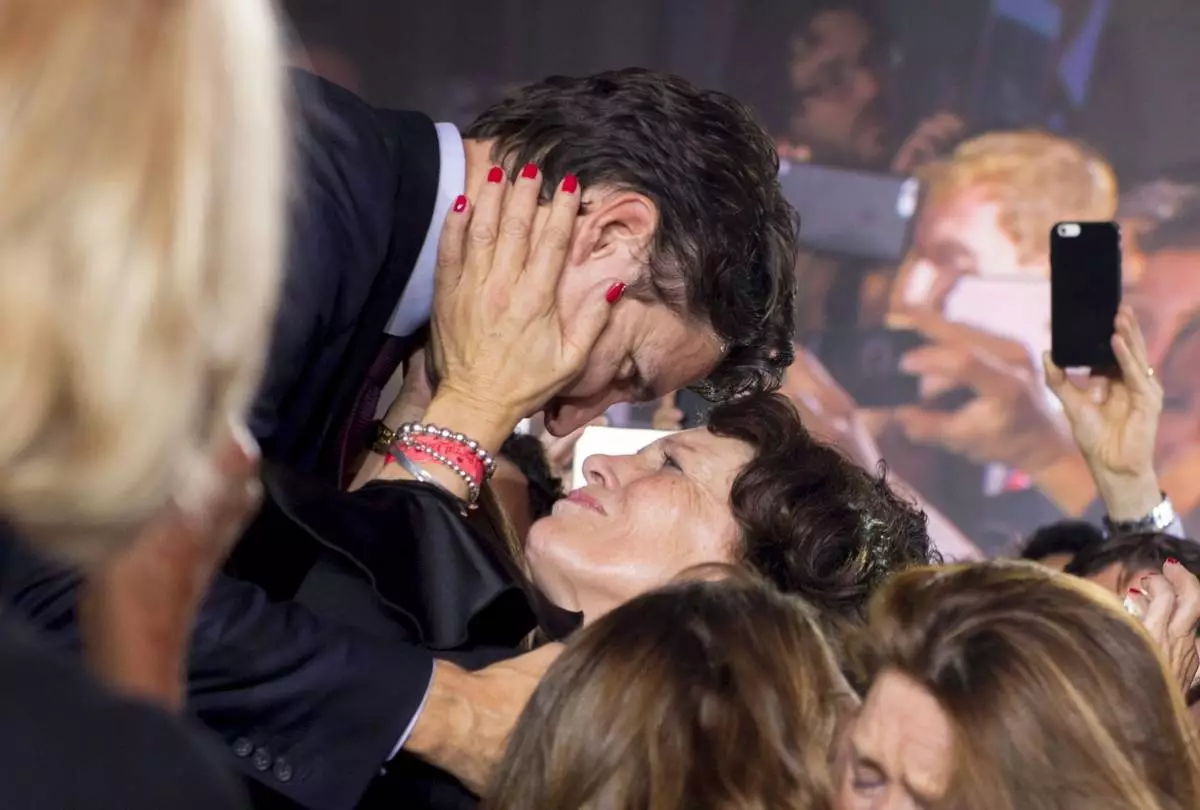
FILE - Liberal leader and Prime Minister Elect Justin Trudeau hugs his mother Margaret Trudeau as he makes his way on stage for his acceptance speech at Liberal party headquarters in Montreal on Oct. 19, 2015, after winning the 42nd Canadian general election. (Justin Tang/The Canadian Press via AP, File)
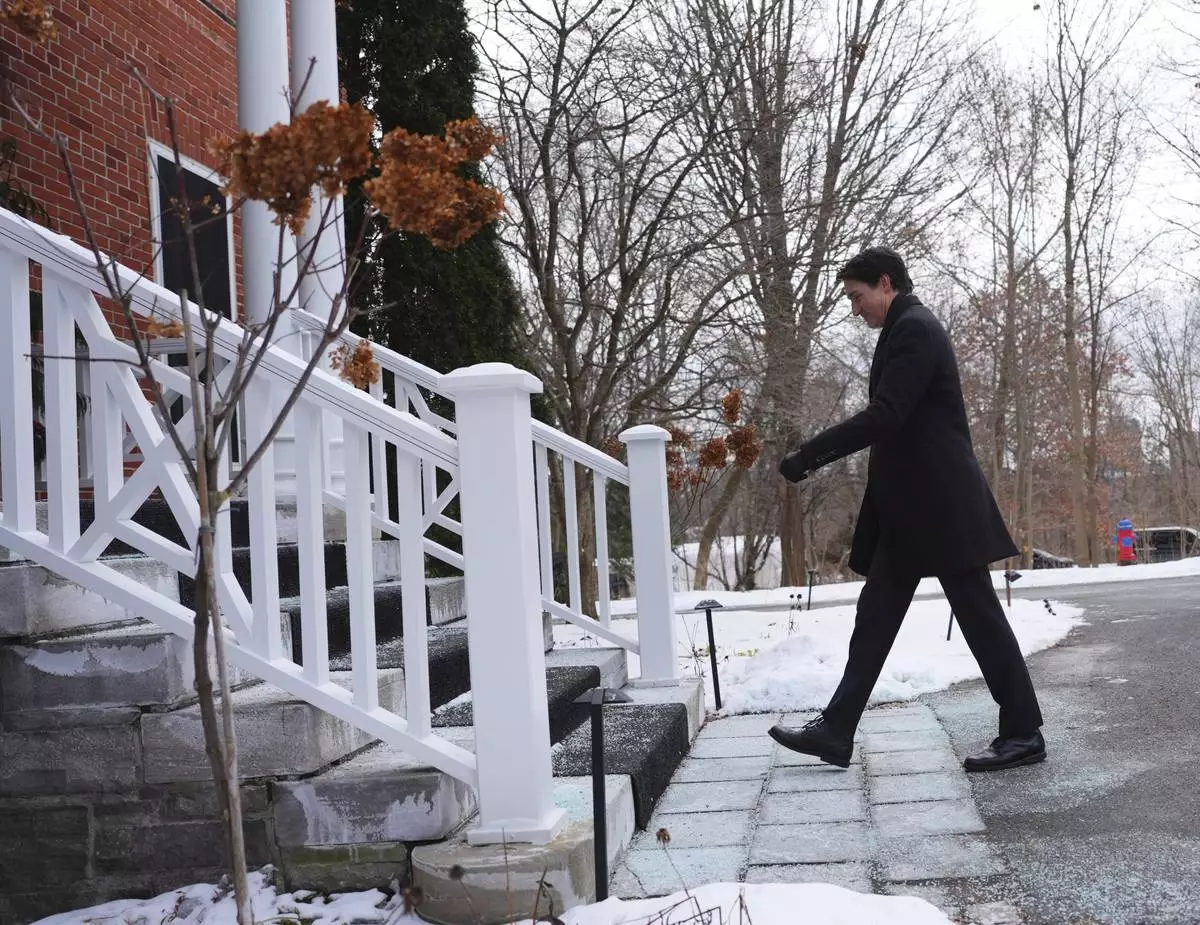
Canada Prime Minister Justin Trudeau leaves a news conference after announcing his resignation as Liberal leader outside Rideau Cottage in Ottawa on Monday, Jan. 6, 2025. (Sean Kilpatrick/The Canadian Press via AP)
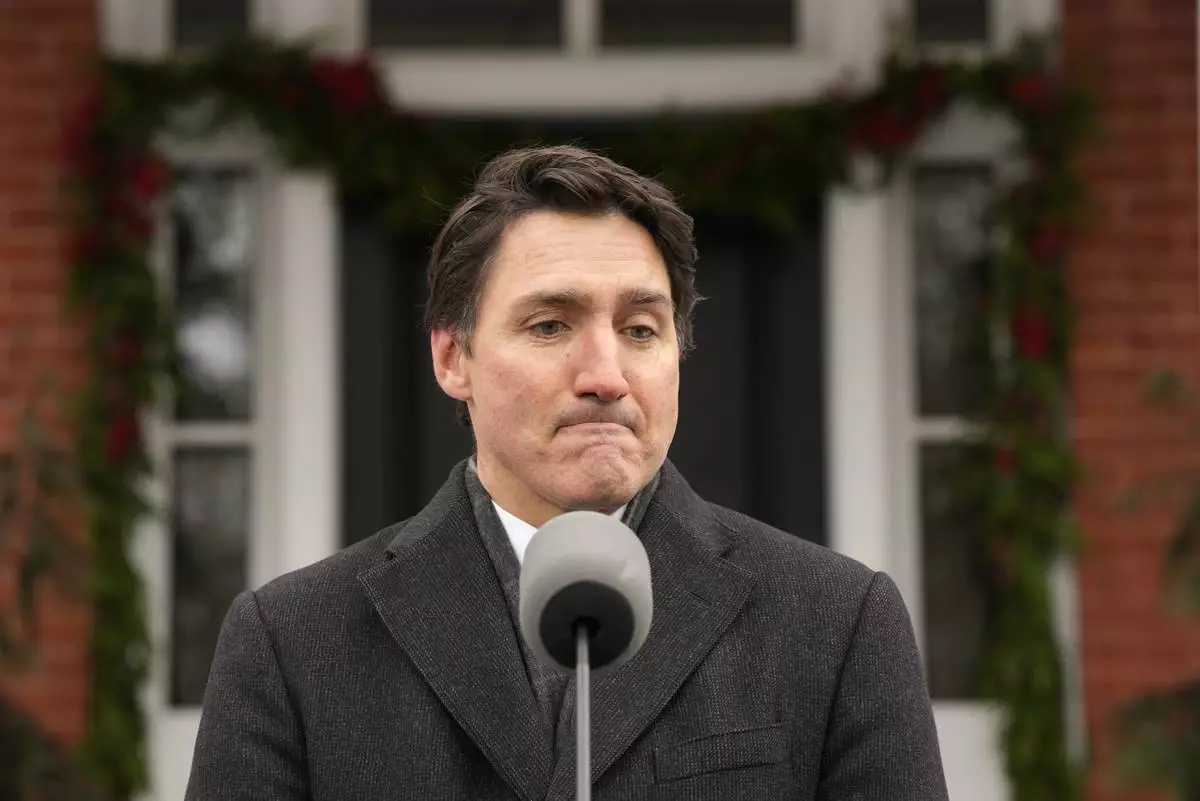
Canada Prime Minister Justin Trudeau makes an announcement outside Rideau Cottage in Ottawa on Monday, Jan. 6, 2025. (Adrian Wyld/The Canadian Press via AP)
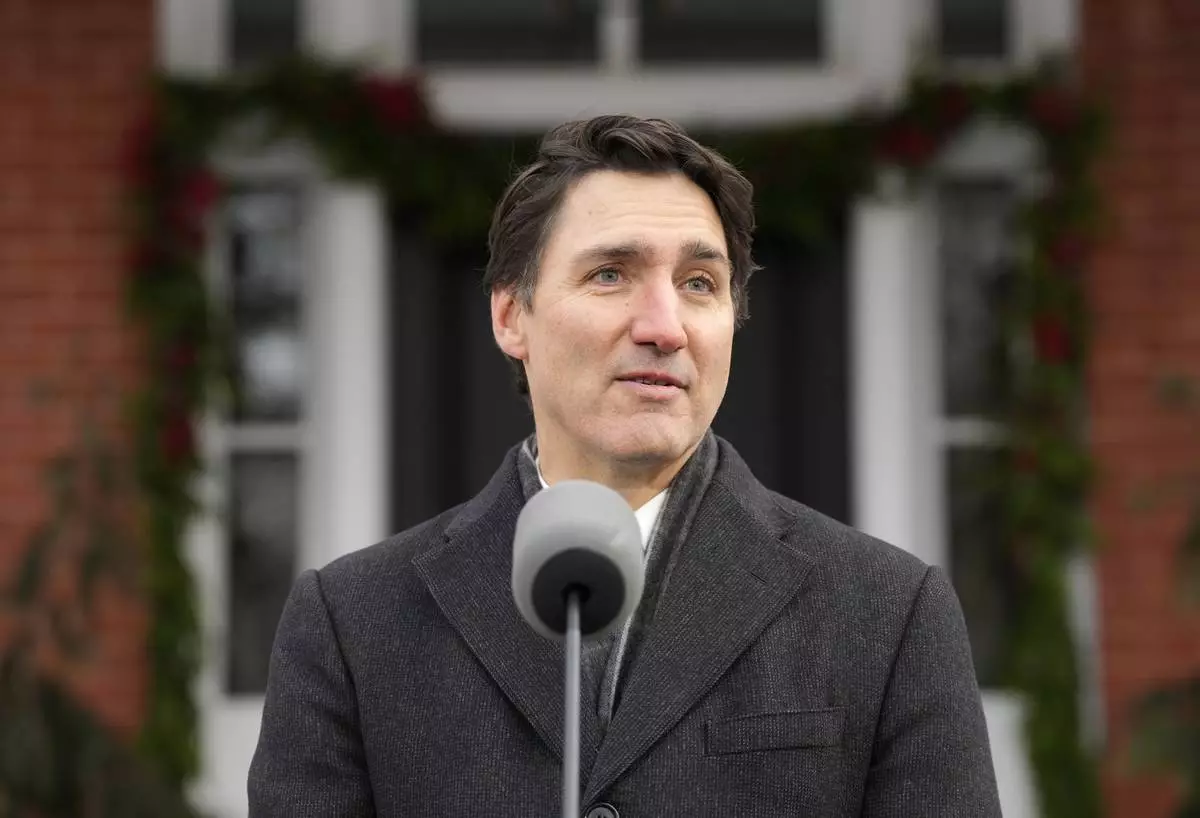
Canada Prime Minister Justin Trudeau makes an announcement outside Rideau Cottage in Ottawa on Monday, Jan. 6, 2025. (Adrian Wyld/The Canadian Press via AP)
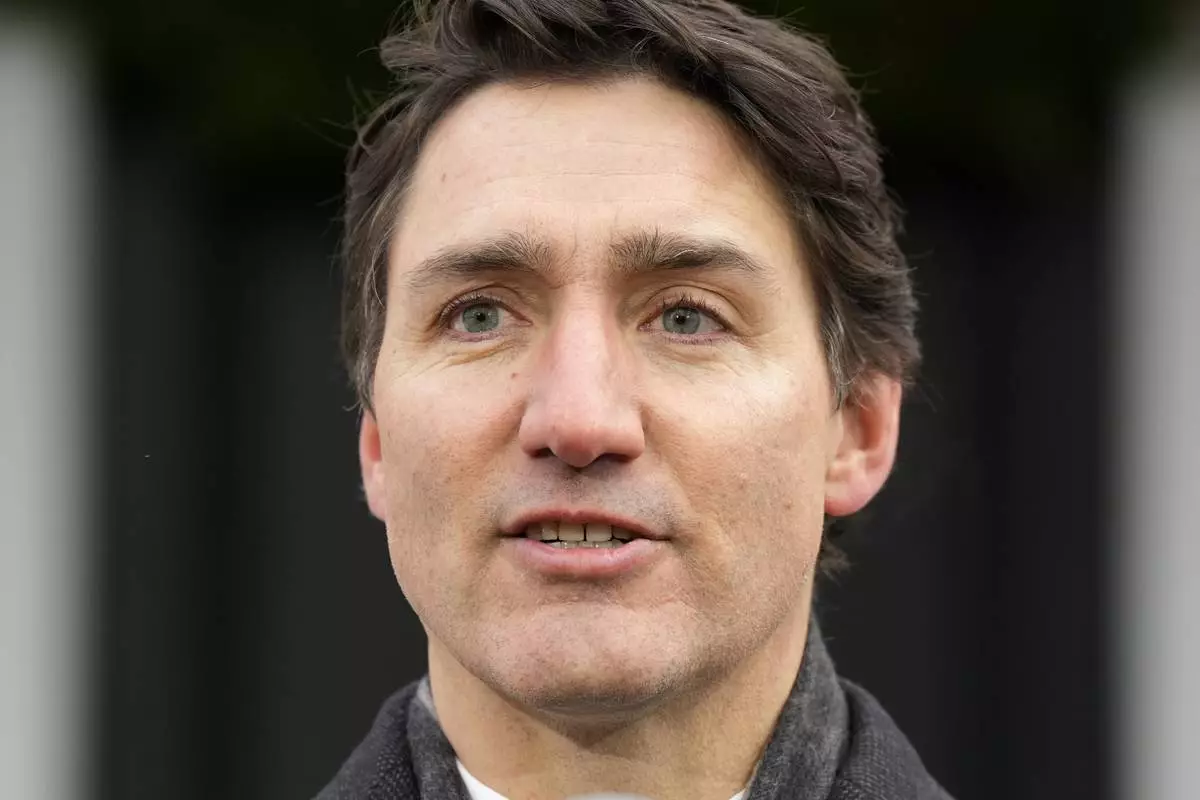
Canada Prime Minister Justin Trudeau makes an announcement outside Rideau Cottage in Ottawa on Monday, Jan. 6, 2025. (Adrian Wyld/The Canadian Press via AP)
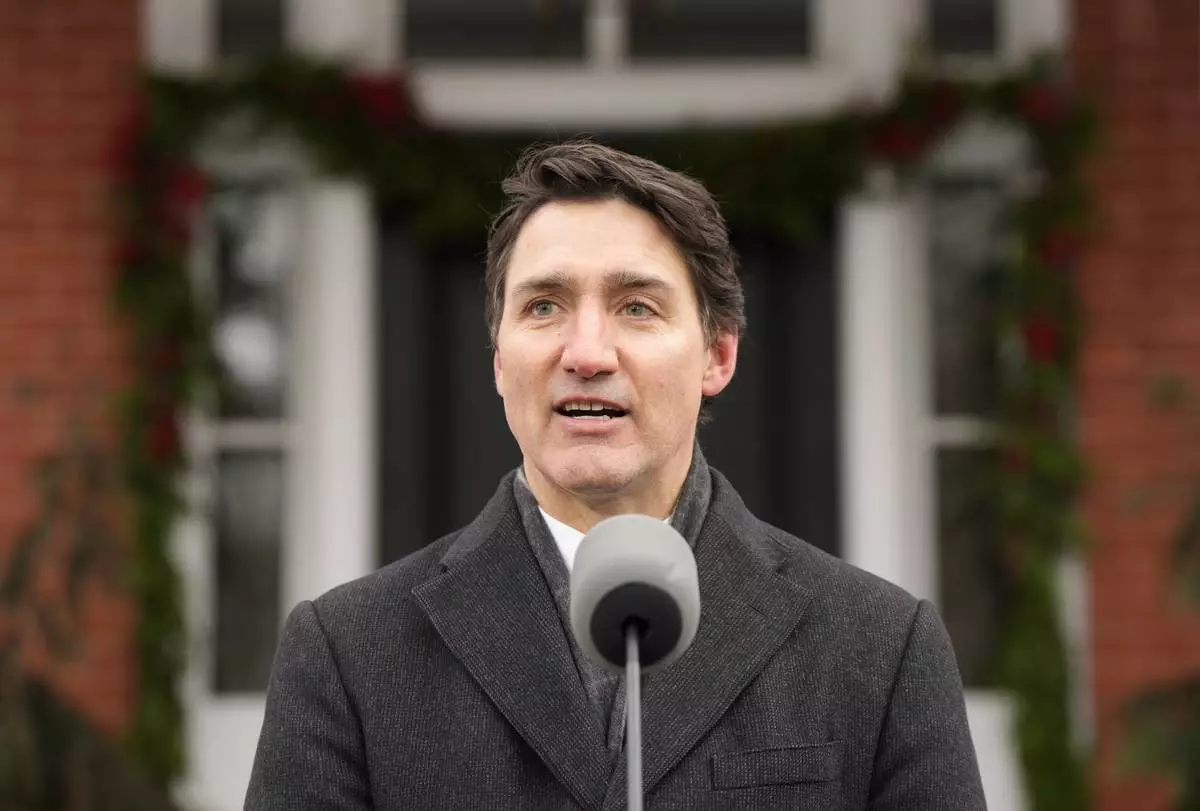
Canada Prime Minister Justin Trudeau makes an announcement outside Rideau Cottage in Ottawa on Monday, Jan. 6, 2025. (Adrian Wyld/The Canadian Press via AP)
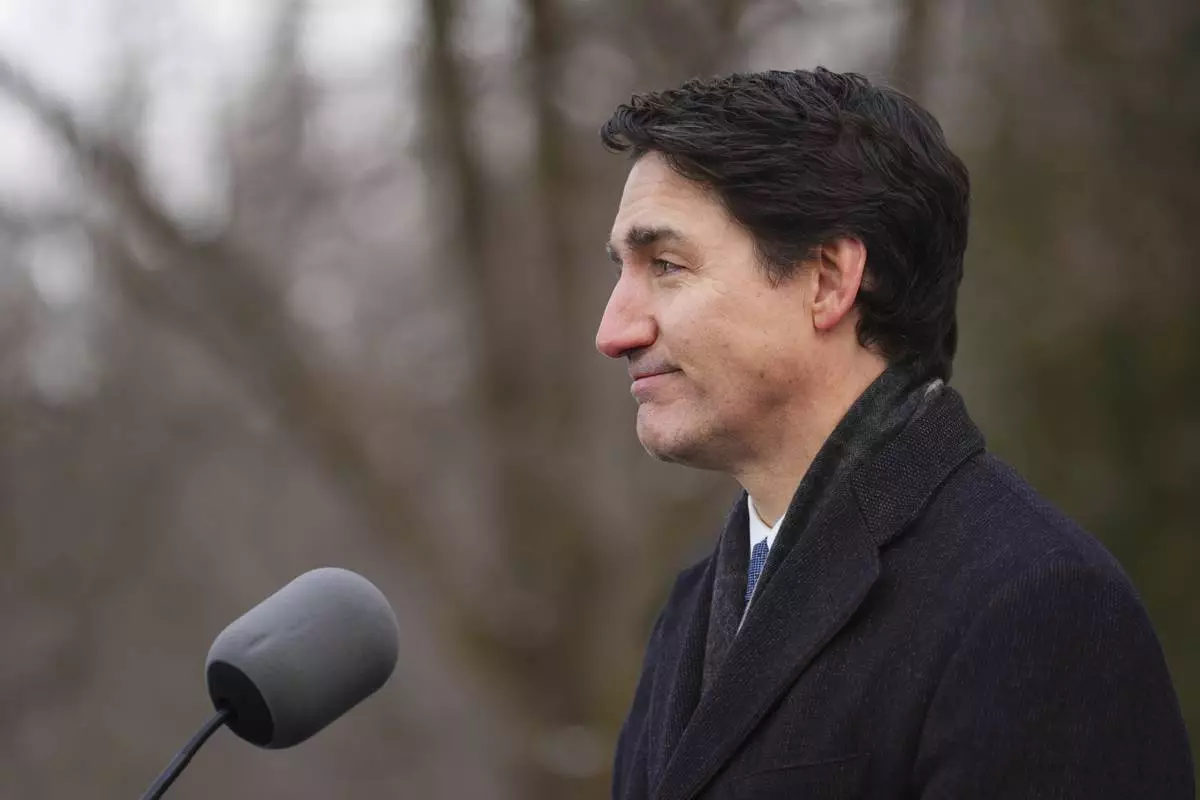
Canada Prime Minister Justin Trudeau announces his resignation as Liberal leader and prime minister outside Rideau Cottage in Ottawa on Monday, Jan. 6, 2025. (Sean Kilpatrick/The Canadian Press via AP)
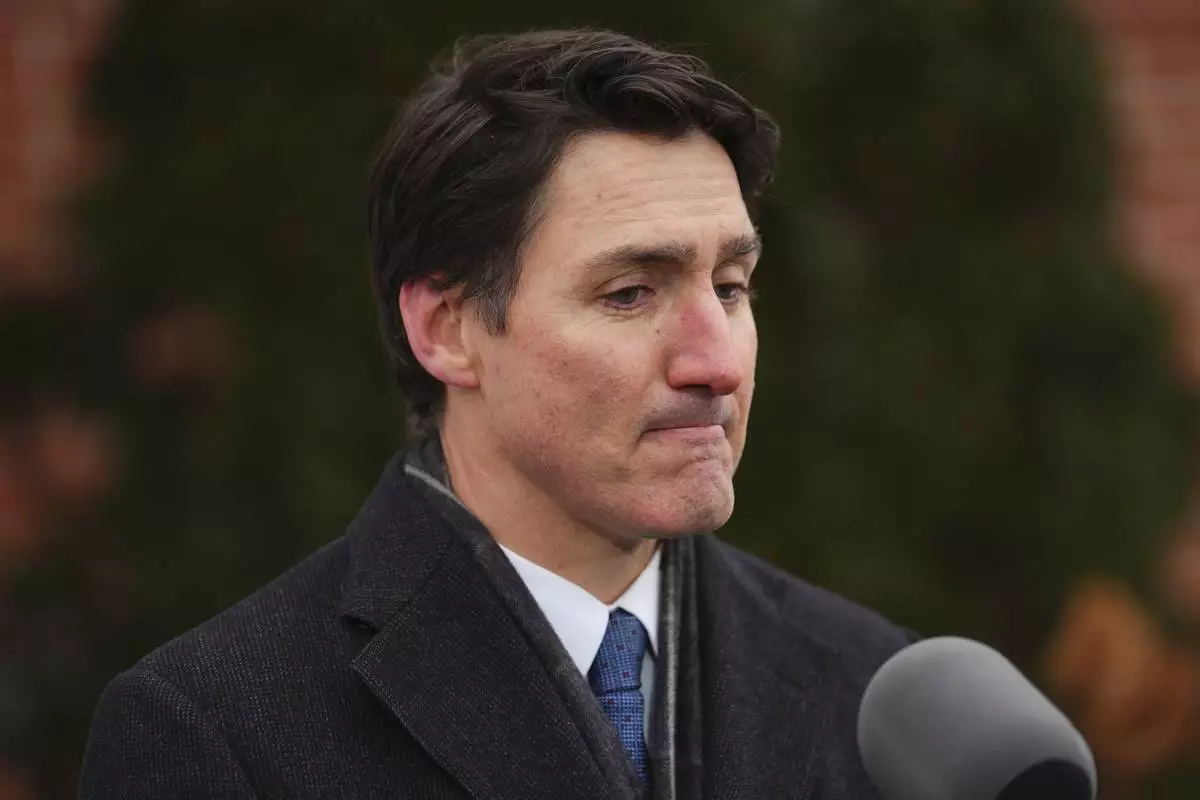
Canada Prime Minister Justin Trudeau announces his resignation as Liberal leader and prime minister outside Rideau Cottage in Ottawa on Monday, Jan. 6, 2025. (Sean Kilpatrick/The Canadian Press via AP)
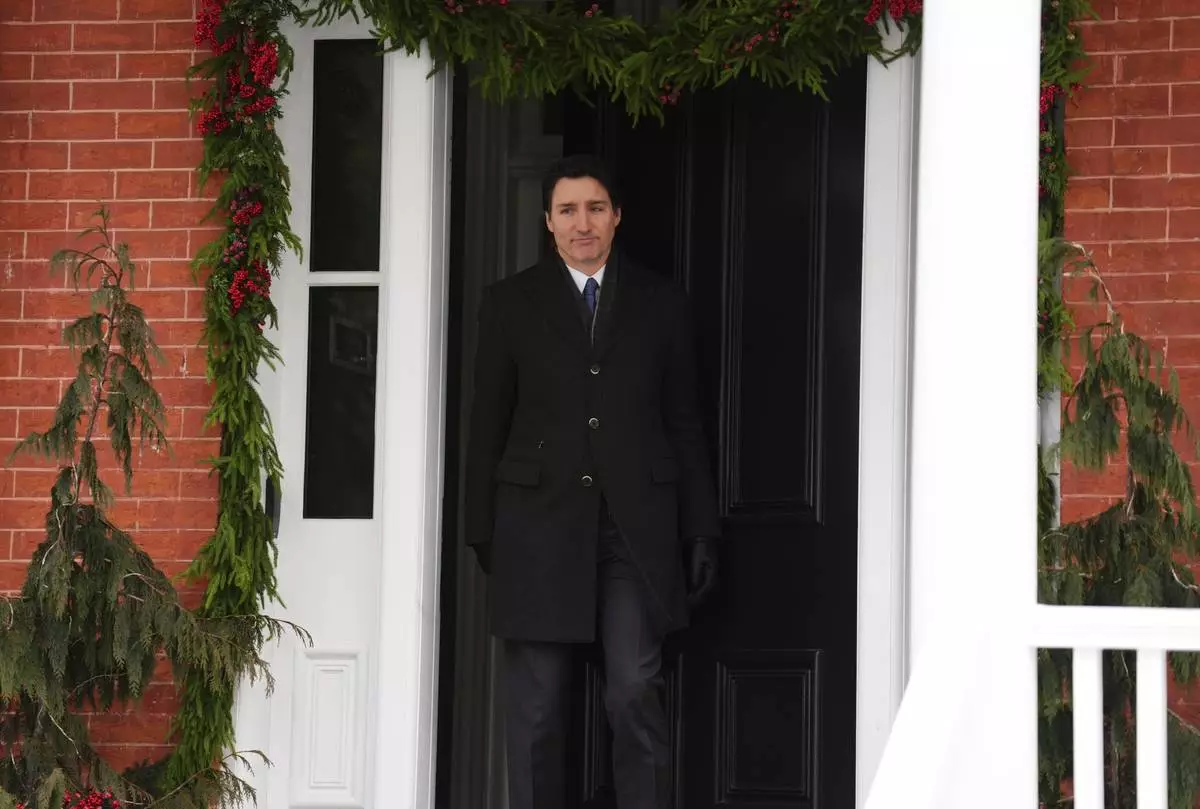
Canada Prime Minister Justin Trudeau arrives to make an announcement outside Rideau Cottage in Ottawa on Monday, Jan. 6, 2025. (Sean Kilpatrick/The Canadian Press via AP)
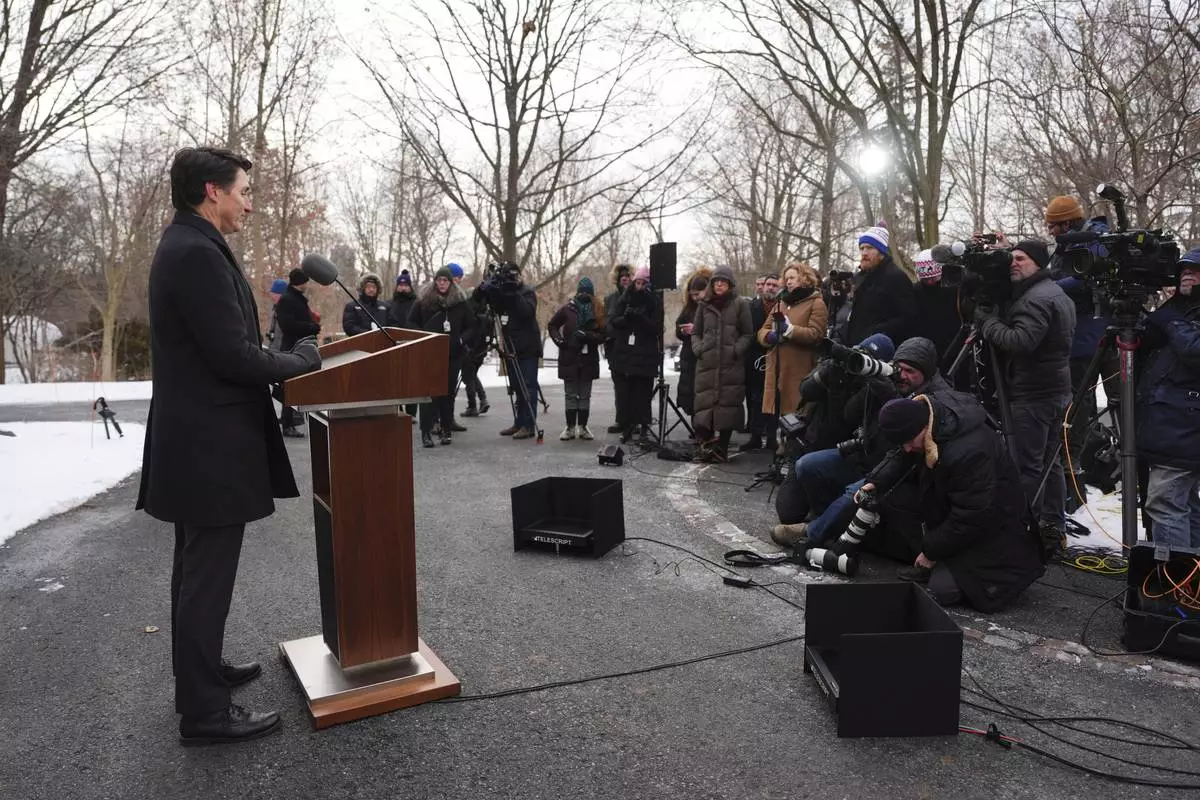
Canada Prime Minister Justin Trudeau announces his resignation as Liberal leader and prime minister outside Rideau Cottage in Ottawa on Monday, Jan. 6, 2025. (Sean Kilpatrick/The Canadian Press via AP)
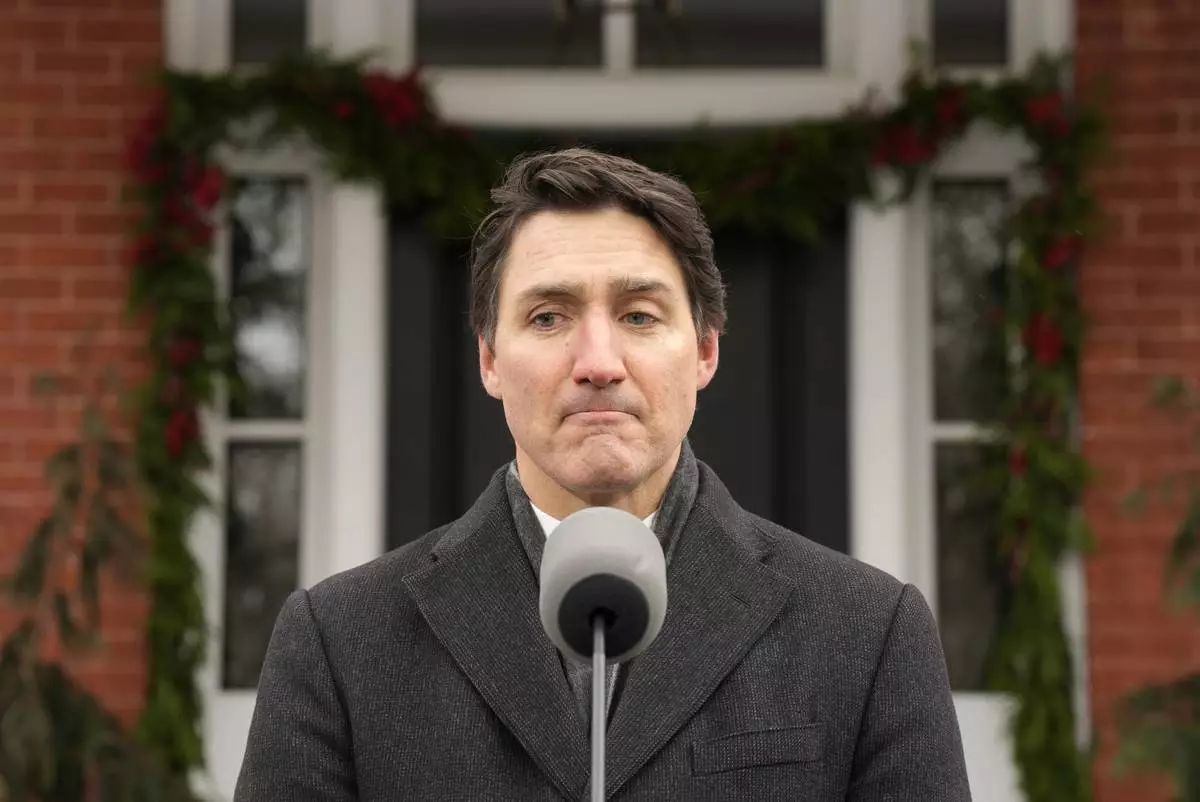
Canada Prime Minister Justin Trudeau makes an announcement outside Rideau Cottage in Ottawa on Monday, Jan. 6, 2025. (Adrian Wyld/The Canadian Press via AP)
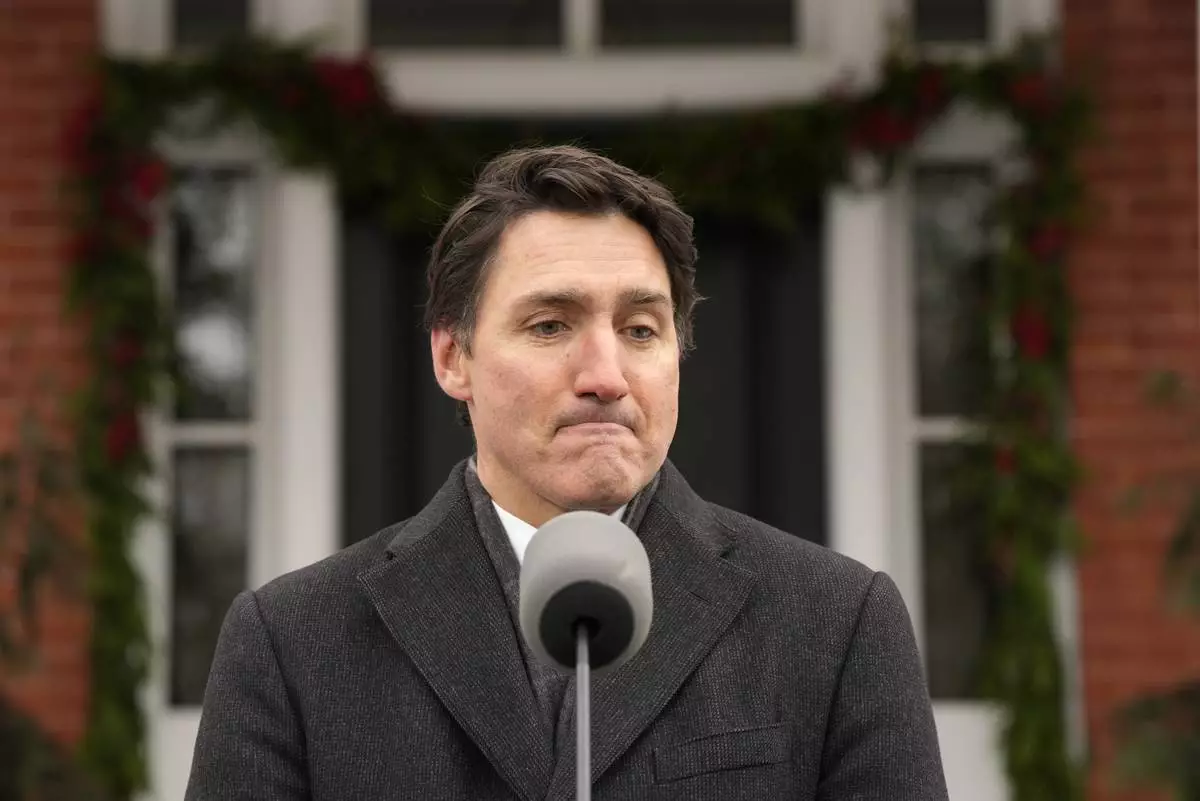
Canada Prime Minister Justin Trudeau makes an announcement outside Rideau Cottage in Ottawa on Monday, Jan. 6, 2025. (Adrian Wyld/The Canadian Press via AP)
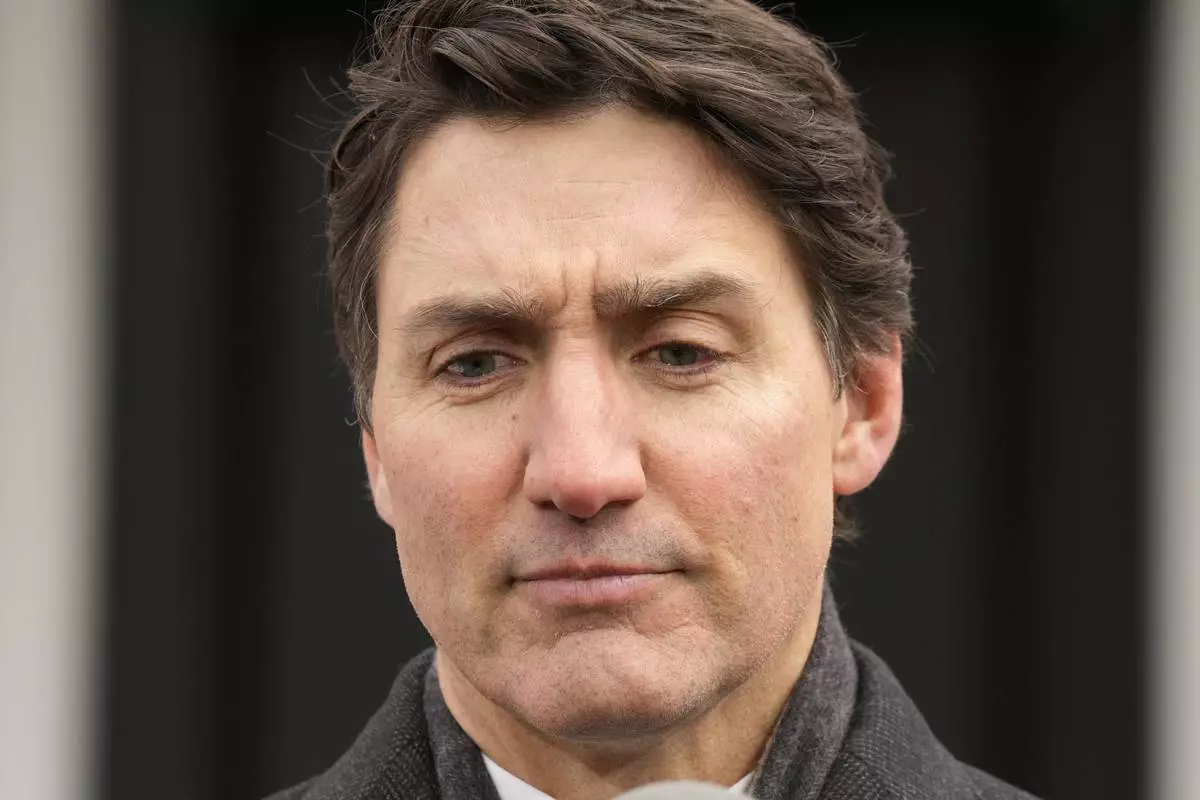
Prime Minister Justin Trudeau makes an announcement outside Rideau Cottage in Ottawa on Monday, Jan. 6, 2025. (Adrian Wyld/The Canadian Press via AP)






